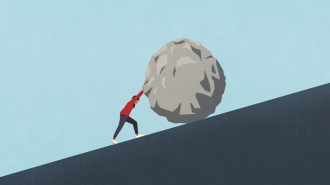Highlights from the Psychonomic Society annual meeting
Summaries from the conference held November 15-18 in Minneapolis
Gestures have timely impact on thought
People think differently about the passage of time based on gestures someone else uses while describing, say, a day’s events or the growth of a seed into a flower, Stanford University psychologist Barbara Tversky reported on November 17. In a series of experiments, Tversky’s colleague Azadeh Jamalian of Columbia University asked volunteers to diagram progressions of familiar events. While describing these tasks, Jamalian gestured in a straight line from left to right, gestured in a circle or made no gestures. Most individuals drew linear diagrams after seeing linear gestures and circular diagrams after seeing circular gestures. Linear diagrams predominated if no gestures were used, because people tend to conceive of time as running on a line, Tversky said. Gestures by another person can subtly alter that default notion of how time proceeds, she proposed.
Memory athletes flex their mind power
Top competitors in popular international memory competitions aren’t one-trick ponies. Four of the most accomplished memory athletes, including the top-ranked master of recall, scored much higher than groups of college students on a variety of memory and attention tests, psychologist Henry Roediger III of Washington University in St. Louis said on November 17. Memory competitors scored extraordinarily well on tests of list memory, recall of specific numbers from equations that they had mentally solved, and attention control during attempted distractions. Memory athletes use well-known recall strategies on specific challenges, such as remembering hundreds of rapidly presented numbers, but they possess much broader mental prowess than that, Roediger suggested. It’s not known whether recall gurus start out with super memory and attention or benefit from practicing memory techniques.
Clumpy expectations for hide-and-seek
Adults and children alike hide valuables in clumps to make them easy for others to find and scatter goodies widely to keep them hidden, psychologist Andreas Wilke of Clarkson University in Potsdam, N.Y., reported November 16. Humans have evolved to expect that food and other resources occur in patches, Wilke theorizes (SN: 2/12/11, p. 26). In one experiment, 5- to 8-year-olds hid 20 marbles in 100 boxes arrayed on a playground after being told to make it hard or easy for other kids to find the toys. Adults received the same instructions before playing a computer game in which they hid $1 tokens in a grid of 100 squares. In both games, seekers did much better when trying to find marbles or tokens hidden in clusters. If seekers knew that valuables were tough to find, they covered more territory from one move to the next.







